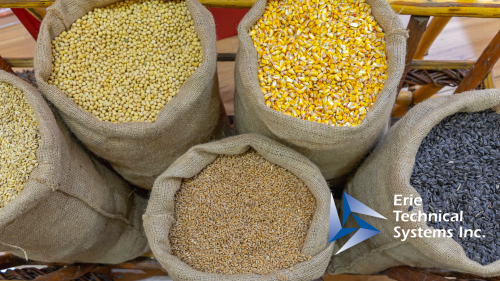One of the most common industries to require bulk material handling is the food processing industry. From grains and flour to sugar and spices, the transportation and processing of these materials require specialized solutions. This guide explores the various bulk material handling solutions tailored for the food industry, ensuring safety, efficiency, and compliance with regulations.
Understanding the Challenges
The food industry faces unique challenges in bulk material handling, including:
Hygiene and Safety: Preventing contamination is paramount to ensure food safety.
Preservation of Quality: Maintaining the integrity of food products during handling is crucial.
Regulatory Compliance: Adhering to stringent food safety standards set by authorities like the FDA and HACCP.
Efficiency: Streamlining operations to meet high production demands.
Key Solutions for Bulk Material Handling in the Food Industry
1. Food-Grade Conveyors:
Types: Belt conveyors, screw conveyors, and pneumatic conveyors are commonly used, each with designs that facilitate easy cleaning and prevent contamination.
Features: Stainless steel construction, smooth surfaces, and easy-access components for thorough cleaning and sanitation.
2. Bulk Bag Unloaders and Fillers:
Unloaders: Designed to safely and efficiently discharge bulk bags of raw materials into the processing system. Features like dust-tight enclosures and sanitary design ensure minimal contamination risk.
Fillers: Used for packaging processed food products into bulk bags for transportation or storage. Precision weighing systems ensure accurate filling, while sanitary designs prevent product contamination.
3. Vibratory Feeders:
Ideal for controlled feeding of bulk materials into processing lines. Their gentle handling preserves the quality of delicate food products.
4. Bucket Elevators:
Used for vertical conveying of bulk materials. In the food industry, they're often designed with easy-clean features and food-grade materials to maintain hygiene standards.
5. Storage Solutions:
Silos and bins designed for food storage must prevent contamination and allow for easy cleaning. Features like smooth interior walls and moisture control systems help maintain the quality of stored materials.
Considerations for Choosing Bulk Material Handling Equipment
Material Characteristics: Understanding the properties of the food products being handled (e.g., particle size, moisture content, and flowability) is crucial for selecting the appropriate equipment.
Hygienic Design: Equipment should be designed with hygiene in mind, featuring smooth surfaces, minimal crevices, and easy disassembly for cleaning.
Scalability: The ability to adapt to changing production volumes and product types is important for long-term operational flexibility.
Automation: Automated systems can improve efficiency, reduce labor costs, and minimize human error in material handling processes.
Energy Efficiency: Selecting energy-efficient equipment can reduce operational costs and contribute to sustainability efforts.
Innovations in Bulk Material Handling for the Food Industry
Technological advancements continue to shape bulk material handling solutions, with innovations like:
Smart Conveyors: Equipped with sensors and IoT connectivity, these conveyors provide real-time monitoring and diagnostics, optimizing performance and reducing downtime.
Robotic Automation: Robots are increasingly used for tasks like palletizing and depalletizing, offering precision and flexibility in material handling.
Sanitary Design Innovations: Developments in equipment design, such as self-cleaning mechanisms and antimicrobial coatings, enhance hygiene and safety in food handling.
Bulk material handling solutions for the food industry are vital for maintaining product quality, ensuring safety, and achieving operational efficiency. By selecting the right equipment and embracing technological innovations, food manufacturers can overcome challenges and meet the demands of a dynamic market. As the industry continues to evolve, staying informed about the latest trends and advancements in bulk material handling will be key to success.

